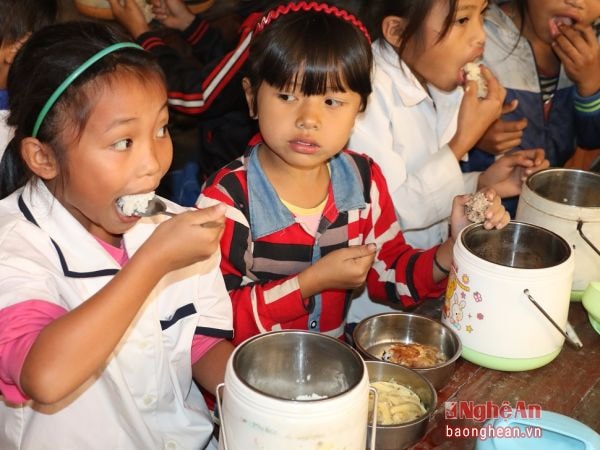Maintaining boarding meals: 'Looking' to social mobilization
(Baonghean) - Entering the 2016-2017 school year, a series of primary schools in mountainous districts in Nghe An province have stopped organizing meals for boarding students. This was also predicted before the support programs ended and the mobilization of social resources still encountered many difficulties.
Contribute to improving the quality of teaching
Luu Kien 1 Primary School has 380 students, of which 70% are from poor households and are all children of ethnic minorities. Previously, although the total number of classes was not large, because the students were scattered in the villages, the school had up to 5 satellite schools. Currently, although it has been reduced to 4 schools, teaching and learning, and motivating students to attend school regularly are facing many difficulties, especially when the Seqap Program supporting meals for boarding students ends.
At Luu Son School (Luu Kien 1 Primary School), one of the most difficult schools to travel to, with more than half of the students being Mong ethnic minority, teacher Pham Thi Nga - head teacher of class 1B said: "The class only has 15 students, but 9 of them are children from Pung village, 4 km away from the school, so when it rains heavily, all the students are absent from school. There were times when 10-15 students in the entire first grade class were absent because the road was too far and there was no one to pick them up. This greatly affected the quality of teaching and learning..."
 |
| Meal time of primary school students at Yen Na 1 Primary School (Tuong Duong). |
Due to difficult travel conditions and parents working in the fields, many students have to take a lunch break at school. Lunch is usually prepared by parents early in the morning, sometimes just a simple sandwich. Looking at the students' circumstances, what teachers in the school want most is to continue implementing the boarding program as in previous years.
Teacher Nguyen Van Vuong - Principal of Luu Kien 1 Primary School said: "Thanks to the organization of boarding meals at school, the effectiveness of teaching 2 sessions/day at school has improved significantly in recent years. However, this year, the implementation encountered many difficulties because most of the parents are poor households and cannot afford to pay for their children to study at boarding school."
In the entire Tuong Duong district, 13/15 primary schools that benefited from projects to support boarding meals for students this school year also stopped implementing them for the same reason.
In Ky Son district, since 2011, with the support of the school education quality assurance program (Seqap Program), 18/33 primary schools in the area have organized boarding meals for students at school.
Statistics from the Department of Education and Training of Ky Son district also show that the rate of excellent students in schools benefiting from the program is 5% higher than that of normal students, the rate of weak and poor students decreased by 3% and the attendance rate reached 96.7%, 3% higher than that of normal schools.
Also because of the above positive results, entering the 2016-2017 school year, determining that there would be no more support projects, the Department of Education and Training of Ky Son district soon directed schools to mobilize social resources to continue maintaining boarding for students. However, despite great efforts, currently there are no schools in the area that have enough conditions to continue implementing.
Need to promote the model of "boarding school for the people"
Since the beginning of the 2010-2011 school year, the boarding meal program has been expanded to nearly 150 schools in remote districts. Due to the effectiveness of the program, many schools have used it flexibly and economically, and with the support of parents and social organizations, it has been deployed to 100% of students and received the support of many parents.
Now that the program has ended, the biggest challenge is to mobilize parents to contribute in a socialized way. The main goal is for parents to pay money to organize meals for students. Or, the organization can be done in the form of boarding, where parents prepare the children's daily meals at home.
At Yen Na 1 Primary School - one of the two remaining schools in Tuong Duong district that still maintains meals for students, teacher Nguyen Van Thanh - Principal of the school said: "In reality, it is not easy to change parents' perception from being "supported" to having to "contribute". But if we organize a parent meeting and carefully analyze the practical effects for parents, they will agree. Every day, parents will prepare meals for students to go to class. Teachers in the school volunteer to stay and work overtime to organize meals and sleep for students."
Boarding with local people is also a method applied by many kindergartens in Tuong Duong district and has brought quite good results, ensuring that 18/18 kindergartens can organize boarding programs for students.
The way of working and the responsibilities of the staff and teachers of Yen Na 1 Primary School are also a good experience for other schools in the area. From there, schools will soon have solutions to overcome current difficulties, contributing to gradually improving the quality of teaching and learning; contributing to changing the awareness and responsibilities of parents...
My Ha
| RELATED NEWS |
|---|









